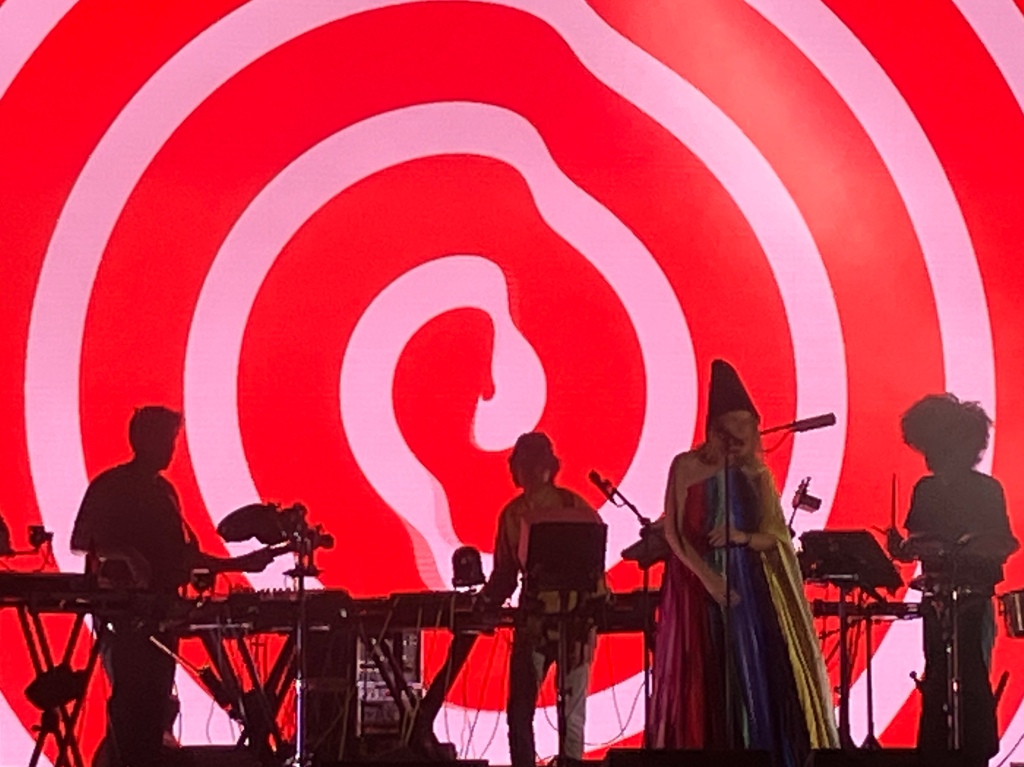
RóISÍN MURPHY, the absolute Queen of Everything, first came to the attention of the more discerning music lovers of the UK in the early 90s, working with Mark Brydon in a strange electronic-soul duo from Sheffield.
They were named after the Russian word for milk – Moloko – cribbed from the wholesome drug-in-a-drink in Anthony Burgess’s A Clockwork Orange.
For me, Moloko’s music was notable for its top-quality tunes, its genre-bending, hugely likeable and unrelenting oddness, and Róisín Murphy’s engaging, acrobatic and occasionally breath-taking vocals – and her willingness to mangle these often achingly beautiful vocal performances into new and strange shapes.
She’d go from Karen Carpenter to Pinky & Perky to the girl from the Exorcist in the space of a few seconds. Moloko’s songs were bewildering and beguiling in equal measure.
And the lyrics – funny, daft/clever wordplay and tall tales of ego-maniac pharaohs, party weirdos and dirty monkeys, cheeky monkeys, all solemnly delivered by the Queen of Sass like this was the most serious shit in the world – were a cut above the contemporary club dreck of the era.
Moloko were also the antithesis of the epic shithousery of Britpop – Pulp excepted, obviously – which was starting to kick up a stink at the same time.
Moloko were part of a very Sheffield musical lineage of bloody-minded independence and commonsense machine funk that started with Cabaret Voltaire and the Human League, continued with Clock DVA and Chakk, and continues to this day with the likes of the Black Dog and Adrian Flanagan and his many, many aliases.
Holed up in scenic South Yorkshire, Moloko seemed very different to anyone else. But they had the funk and they had the weird. In spades.
Somehow, they even had two or three actual hit records.
Steeped in northern English club culture, and its arcane rituals and mores as much as its forward-thinking futurism, Moloko were never one of those unfortunate acts whose music must be remixed beyond all recognition to get it anywhere near a dancefloor. Their quirky, soulful electronic funk was both inspired by and made for the dancefloor in the first place.
They were not fucking about.
It’s a great theory, apart from the fact that it was actually a remix that gave Moloko their biggest hit, The Time is Now.
The single had some success on its initial release in early 1999 before getting reworked by Todd Terry on the back of the success of his take on Missing by Everything But the Girl.
Murphy and Brydon, however, insisted their label release another version by Boris Dlugosch – maximising the sunsoaked, giddy excitement of the original – and were vindicated when it exploded all over Ibiza that summer before reaching number two the Top 20 in the UK.
But Moloko’s hit records do not concern us here.
Since she went solo, Róisín has worked with a succession of genuinely cutting-edge producers, many of whom previously worked their magic on Moloko.
Big label, small label or no label, she appears to exert absolute control over what goes on in her career – words, music, pictures, production, presentation, lights, action, love and laughter and happiness.
She is an inspiration and an innovator, punk as fuck, hard as nails and as camp as Christmas. Full disclosure: She can do no wrong.
This is a totally subjective list of some personal highlights from Róisín’s glittering solo career. It’s my favourite stuff from the Murphy oeuvre this week, that’s all.
Despite our heroine releasing a succession of certified, copper-bottomed club bangers over the years, many of which are often delightfully reimagined and repurposed live, much of this stuff here moves at a decidedly slower pace.
This is partly to justify a title that is half decent at first glance and teeth-grindingly labored at the second, and partly because, like many veteran, first-generation stormtroopers of rave, I’m getting on a bit.
And I was at it for quite some time before acid house came along.
No. Life’s too short for fast music. These days, I am, it seems, all about the chug. Live slow, die old, leave an elegantly wasted corpse.
Where was I again?
Either I harangued some unlucky PR into sending me a copy of the double-vinyl album of Handsome Boy Modelling School’s 1999 album, How’s Your Girl?, or I actually bought it just for The Truth, the one track that Róisín features on.
But if you’re going to pay 20 quid for one track, it might as well be one that sounds like The Truth.
Producer Prince Paul creates the vibe of last call at some smoky, after-hours dive bar on the wrong side of town. There’s a down-at-heel jazz trio in the corner, cranking it out one more time but they’re fading fast.
A wonky piano, and loose, almost slapdash drums and bass accompany la diva sadly delivering a little hardcore reality to some hapless bloke who lacks even the most basic self-awareness.
Obviously, we’ve all been there – some of us more than others: busted – but the mixture of resignation and brittle bravado Róisín brings to an exquisite vocal performance is simply heart-breaking.
Dan the Automator’s rhyme continues the judgemental theme but the truth is, I’m not sure I would’ve missed him if he wasn’t there.
If We’re in Love blew my mind when I first heard it – and it has continued to do so ever since.
The result of a collaboration with top producer Matthew Herbert for the Sequins EP from 2005 (which was basically the Ruby Blue album, but over three separate records rather than one CD. I think), it was Murphy’s first musical project after Moloko ended.
You can concentrate on the novelty, the playful, quirky eccentricity – with Herbert’s belief in the medium being the message translating into him using the sounds of objects from Murphy’s everyday life to make the music – or you can focus on the fact that it’s just a fucking fantastic tune.
Herbert’s trademark jazzy, sparsely correct house is matched by a superlative vocal, with Róisín once again laying down some much-needed reality for some guy who doesn’t really get it, yet.
And what a chorus. It’s a low-key classic. We are not worthy.
Dear Miami, from 2007’s Overpowered album, is a brilliant tune in an album stuffed full of them. It’s like a greatest hits album, with banger after banger, ‘hit’ after ‘hit’, like some kind of unstoppable disco party machine dialled all the way up to ONE ZILLION AND ONE.
Despite being nestled among bigger, bolder, brassier numbers, this understated little gem – which Murphy initially began with producers Seiji and Paul Catto before finishing it with Jimmy Douglass – stands out a mile.
Seemingly drawing on Murphy’s experience with Moloko on the promotional merry-go-round of the Miami Winter Music conference – known as much for its wearisome Dionysian poolside excess as it is for breaking actual decent music – Dear Miami does not seem entirely unsympathetic to what from afar can often seem like an entirely bleak and soulless industry danse macabre.
But while Murphy diplomatically avoids biting a big chunk out of the hand that feeds her, nevertheless, I detect disapproval.
Put it this way, that ‘Strictly rolling VIP’ line does not appear to celebrate those ‘lucky’ few partying beyond the velvet rope. As anyone with a mental age of 12+ knows, the VIP area is absolutely the very last place you should go if you’re looking for fun and excitement, pretty much in any context anytime, anywhere.
This song is actually a warning, if you think about it. Take heed. Leave them to it. Don’t get involved.
But those strings! That guitar lick! That soaring, gliding vocal! This kind of elegant excess I can handle. Fetch me a bucket!
She just makes it seem so effortless. And by the way Miami, know this: Róisín isn’t mad with you, but she is disappointed.
Opening 2015’s superlative Hairless Toys album (Murphy’s first proper album after Overpowered), produced by longtime collaborator Eddie Stevens, Gone Fishing is a tender, delicate, bloodied but unbowed affirmation of the NYC ballroom scene documented in Paris is Burning.
The mid-80s glory days of the ballroom scene allowed gay men to find new families to replace those that had rejected and cast them aside, with each sashay down the runway another step “away from a place of hopelessness” – even as Aids tore through these same outsider communities.
Rather than the maximalist musical hawt couture that accompanied NYC’s glamazons and banjee boys in situ, Gone Fishing deploys a woozy minimalism, a ghostly, one-note piano motif here, guitar of a distinctly skeletal and melancholy hue there – and a drummer who is clearly just itching to play bossa nova.
Murphy’s peerless phrasing – informed by hip hop, if not actual hip hop – has a characteristically languid but defiant vocal simply dancing around an oddly pensive melody.
Nobody is avoiding the elephant in the room – they’re actually riding it down the runway, slapping its arse – but the fragile, precarious and precious vitality of the inclusive communities forged by the Children seems very stark.
Gone Fishing makes me feel happy and sad all at the same time. It is, quite simply, the tits.
Although House of Glass appeared on Hairless Toys originally, Maurice Fulton’s rework (a one sided 12-inch with, thrillingly, a portrait of Murphy etched into the other side) takes this full-on ecclesiastical banger to another level.
Fulton simply reduces the tempo by about 20bpm and strips everything back to the bare essentials, transforming it into the superlative mid-80s Compass Point dubby funk jam we didn’t even know we needed.
I’m pretty sure the vocal was re-recorded too.
I played the remix at the world-famous Golden Lion in cosmopolitan Todmorden earlier this year and the place went off. I can think of no greater endorsement.
Apparently this was the first thing Murphy and Maurice – another Sheffield connection – have been able to do after trying to work together for years. This was the first time the stars and their schedules aligned.
It was swiftly followed up by a series of equally excellent EPs of new, original material.
They make very special stuff together. More please, soon.
In the meantime, we can look forward to another new album from Micky Murphy’s indefatigable daughter later this year – named, ironicalism alert, Hit Parade and released on Coldcut’s Ninja Tunes label – once again collaborating with DJ Koze after her sterling if brief work on his 2018 Knock Knock album.
See the promo video for Coo Coo, the first single from the album, here.
I’m hoping for deep, I’m expecting meaningful, and I’m pretty certain it’s going to be interesting. How could it be anything else? See you in September, pop pickers.

I may have zero interest in this music but it’s a joy to read. You write beautifully.
Nicest thing anyone has said to me all week. Thank you very much!
Seriously, it’s a great skill to be able to keep a reader absorbed and entertained, whatever the subject. Well done 👍
Cheers!